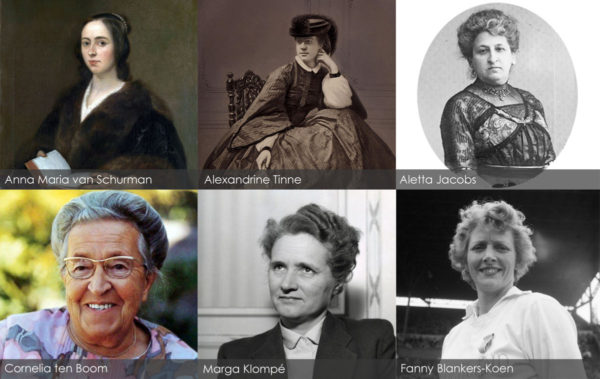History is filled with inspirational women who defied the odds, battled against those who would put them down and believed in themselves regardless of what society told them they should be. Here is a list of some of the inspirational Dutch women who have made it into the history books for reasons other than their appearance.
Anna Maria van Schurman, 1607 – 1678
Anna Maria was the first woman to attend university in the Netherlands, and maybe even in Europe. In 1636 she enrolled in Utrecht University, where she attended lectures hidden behind a curtain, so as not to distract the other male students. She was proficient in 14 languages, a scholar, a poet and was recognized as a painter by the St. Luke Guild of painters in 1643. She was also a strong advocate for female education.
Alexandrine Tinne, 1835 – 1869
Alexandrine was a Dutch explorer in Africa and the first European woman to attempt to cross the Sahara Desert. In 1862 Alexandrine, accompanied by her mother and aunt, began her exploration of the White Nile regions. During the exploration both her mother and aunt lost their life to fever, causing Alexandrine to return to Cairo. The geographical and scientific results of the expedition were highly important, including the introduction of 24 new plant species to science. Later, in 1869, Alexandrine started out on a new expedition to cross the Sahara Desert, but was murdered by her local guides.
Aletta Jacobs, 1854 – 1929
Although not the first Dutch woman to attend university, Aletta was the first Dutch woman to complete a university degree (medicine). After completing her studies in Groningen, she went on to be the first female physician in the Netherlands, and ran a free medical clinic to treat destitute women and children. Throughout her life she fought for equal rights for women in the Netherlands and around the world.
Cornelia ‘Corrie’ ten Boom, 1892 – 1983
During the Second World War, Corrie and her family opened their home to refugees – both Jews and members of the resistance movement – offering them a place to hide. On February 28, 1944 the entire ten Boom family was arrested by the Nazis following a tip off from a Dutch informant. The six people hidden at the ten Boom home at the time of the raid were not found and were helped to safety by the Dutch resistance. Corrie and her sister Betsie were eventually sent to Ravensbruck concentration camp. Betsie passed away at the camp, and Corrie was released due to a clerical error, saving her life, as a week later, all the women in her age group were sent to the gas chambers. After the war, Corrie continued her work setting up a rehabilitation center to help those in need of care.
Marga Klompé, 1912 – 1986
Marga attended Utrecht University, where she obtained an MSc degree in chemistry, and a PhD degree in mathematics and physics. She also began studying medicine, but when the Second World War broke out the university closed, interrupting her studies. During WWII, Marga became active in the Dutch underground resistance as a messenger. After the war, Marga began work in politics and in 1956 became the first female secretary of the Netherlands, focusing on Social Affairs. Her main contribution was the passing of the Social Security Bill in 1963, which replaced the previous Poverty Bill.
Fanny Blankers-Koen, 1918 – 2004
Fanny, also nicknamed as ‘the flying housewife’ was a 30-year-old mother of two when she took the world by storm at the 1948 London Olympics, being the most successful athlete at the event. She won gold medals in the 100 meters, 200 meters, 80 meters hurdle and the 4×100 meters relay. She also won five European titles, 58 Dutch championships and set or tied 12 world records. In 1999, she was voted female athlete of the century by the International Association of Athletics Federation.
 +31 (0)50 367 71 97
+31 (0)50 367 71 97  info@connect-int.org
info@connect-int.org
